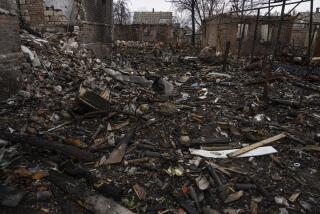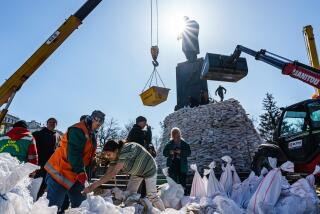COLUMN LEFT : The Cold War’s Devils Were On Both Sides : The Soviets professed regret for past blood spilled. The West has as much to be sorry for.
- Share via
Truth is not only the first casualty of war; it also tends to fare poorly when peace breaks out. In this respect, the Cold War has been no exception. Last week’s 35-nation Conference on Cooperation and Security in Europe was a celebration, an act of closure and an attempt by the victors to write the official history of the conflict: that virtue, by showing steadfast resolve these 40 years, had triumphed over evil.
It was extraordinary that the leaders assembled at the Palace of Versailles should get away with this so easily, given that all around them in Western Europe a story was breaking that showed the mentality of the Cold War in the worst possible light. It first surfaced in Italy, where a provincial judge stumbled on the existence of a secret paramilitary body named Gladio-- the sword. Prime Minister Giulio Andreotti was indignant that Italy should be singled out. Why, he said, these things existed everywhere. And so it turned out. Within days there was confirmation that a dozen European countries had had their local equivalents, part of a “stay behind” network of clandestine groups, formed by the CIA, operated under NATO authority and ostensibly designed to organize underground resistance to a Soviet takeover.
But the Cold War was as much a preemptive operation as a defensive one, and in the minds of its warriors, elected leftist governments and Third World nationalists were as much of a threat as any future fantasy of Warsaw Pact troops storming through the Fulda Gap. When questioned about Gladio recently on Italian TV, former CIA director William Colby said that the defeat of Italy’s legal Communist Party in the 1958 elections was “one of the most beautiful achievements of our organization.” (Colby was Rome station chief at the time.) Gladio’s counterpart in West Germany, whose personnel included former S.S. officers, had a hit list of Social Democrats to be eliminated in the event of a Soviet intervention. Among them, according to one French TV report, was Chancellor Willy Brandt, architect of the policy of rapprochement with the Soviet bloc known as Ostpolitik.
The bloodiest theaters of the Cold War, of course, were not in Europe at all but in Asia and Latin America. The United States was especially given to the use of proxies and clients here, which meant that a lot of the dirtiest stuff was done by remote control, cushioning America’s moral conscience. The rationale for any dirty work was always the nature of the enemy--whether real, imaginary or potential.
But might the world have developed differently if leftists had been allowed to win free elections, if Brandt’s Ostpolitik had been sustained, if nationalists had been permitted to take power peacefully? Would the Soviet Union’s bunker mentality under Leonid Brezhnev have been the same? Might Eastern European communism even have crumbled faster that way, sparing its people years of misery under stagnant and paranoid regimes? These, sadly, are only academic questions now, and few historians will trouble themselves with the speculation.
One of the healthiest aspects of the end of the Cold War has been the Soviet Union’s acknowledgement of its past crimes. In the last year, Moscow has apologized for the invasion of Afghanistan, which Foreign Minister Eduard Shevardnadze said “went against general human values;” condemned the Warsaw Pact’s 1968 invasion of Czechoslovakia; and expressed its “profound regret” for Stalin’s murder of 4,000 Polish military officers in Katyn Forest in 1940.
The Soviet Union lived for decades in lies. Now, having lost the Cold War, it is engaged in the desperate search for a new moral compass. Its need for recantation and truth, for an exorcism of the past, has taken extreme forms. But the West, too, has its pathologies of denial, cover-up and the endless protestation of innocence. The official reaction to the Gladio has been to play them down, to write them off as ancient history, to evade historical responsibility. The United States has never expressed a word of regret for the millions who died in Indonesia, East Timor, Vietnam and Cambodia--all of them, with varying degrees of U.S. complicity, in the conduct of the Cold War. It acknowledges no moral accountability for the murder of priests in El Salvador, even though the killers belonged to a unit created and trained by the United States.
The point here is not to resurrect stale old arguments about the moral equivalence of the two superpowers. It is merely to recognize the Cold War for what it was--a “long twilight struggle” in which unspeakable acts were committed by both sides--and to ask for an honest accounting. But judgment is only ever passed on the losers.
More to Read
Sign up for Essential California
The most important California stories and recommendations in your inbox every morning.
You may occasionally receive promotional content from the Los Angeles Times.













